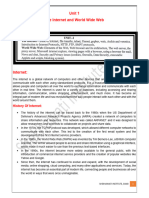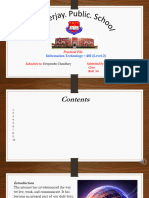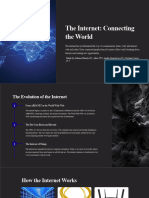0% found this document useful (0 votes)
20 views6 pagesUse of Internet
The document discusses the transformative impact of the Internet on modern society, highlighting its historical development, benefits in communication, education, business, and healthcare, as well as challenges like cybercrime and misinformation. It emphasizes the Internet's role in bridging gaps in developing countries and its future potential with advancements like AI and IoT. The conclusion calls for responsible Internet usage to maximize its benefits while minimizing risks.
Uploaded by
ash34643Copyright
© © All Rights Reserved
We take content rights seriously. If you suspect this is your content, claim it here.
Available Formats
Download as DOCX, PDF, TXT or read online on Scribd
0% found this document useful (0 votes)
20 views6 pagesUse of Internet
The document discusses the transformative impact of the Internet on modern society, highlighting its historical development, benefits in communication, education, business, and healthcare, as well as challenges like cybercrime and misinformation. It emphasizes the Internet's role in bridging gaps in developing countries and its future potential with advancements like AI and IoT. The conclusion calls for responsible Internet usage to maximize its benefits while minimizing risks.
Uploaded by
ash34643Copyright
© © All Rights Reserved
We take content rights seriously. If you suspect this is your content, claim it here.
Available Formats
Download as DOCX, PDF, TXT or read online on Scribd
/ 6




























































































